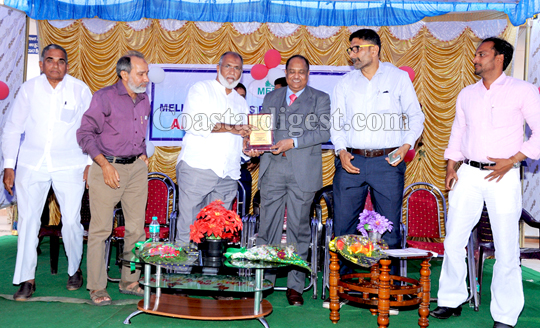Mangaluru, Jan 14: Opining that the lack of encouragement and training is hindering the growth of talented Muslim youths, Abdul Riyaz Khan, former chairman of Chairman of Karnataka Board of Wakf, said that collective effort from the community is necessary to address this shortcoming.
He was speaking at the seventh annual day celebration of Melkar Women’s PU and Degree College in Bantwal taluk on Wednesday.
Lamenting over the lack of political representation of Muslims in Karnataka, he said that even though Muslims have 15% share in the total population of the state, only eleven Muslim representatives are there in the current assembly.
On the other hand, Lingayats, who comprise of 16 to 17 per cent of total population in the state, have around 100 representatives in the assembly, he said.
Among the 1.10 lakh advocates only 8,000 are from Muslim community. Of this, only 1,200 Muslims are working and others only possessed degrees. Similarly, among 1400 women advocates of the state, only 300 are from Muslim community and most of them are not working, he revealed.
The Karnataka high court has only one Muslim judge. In past 28 years the state did not witness even a single district judge from Muslim community. Of the over 2,800 judges in Karnataka only 20 are Muslims, he said adding that in civil service, the representation of Muslims is less than that of SC and ST.
He called upon the talented Muslims to give more priority to administrative and legal fields over medical and technical fields. “We need more advocates, judges, IAS and IPS officer than doctors and engineers,” he said.
Stating that education is a key for the development of Muslims, he applauded the contribution of Melkar women’s college towards education. The college, which started with 40 students in 2009 now has 700 students.
Talent Research Foundation founder Abdul Rauf Puthige, Hidyah Foundation founder HK Khasim Ahmed, KKMA representative SM Farooq, Chairman of the college SM Rashid Haji were present among others.
Prizes were distributed among students on the occasion. PU student Fathima Begum recited Quran. Zuhaira presented a song. B.Com student Mariyam Aabida delivered welcome address. Nashat proposed vote of thanks. B.Com student Naushina Banu compered the programme.





Comments
Congratulations Melkar Women’s PU and Degree College for their Annual Day & a successful event.
We need to bring about unity within all the religions.
We should focus on educating our youth & children to become the leaders of tomorrow.
1 muslim MLA is equal to 100 vokkaligas MLAs. That is why they are scared to give many seats....
Blaming others no use. Our community should take interest to address this major issue by encouraging and supporting the students to join the civil service courses. Giving speech and words do not solve this issue. Congratulation Melkar Womes College management for imparting quality education for the rural female students.
The main problems here not only from Government side!! Muslims have to blame for this!! In Muslims community you can find enough qualified candidates for all those field which mentioned above, but Muslims men after graduating immediately applying for Gulf country, ladies they even for the secure job are not allowed to join, I discuss this matter with many my Muslim friends their opinion same. Muslim organization should bring awareness among their community in this matter, encourage ladies to do the job where they feel safe.
Nothing going to happen. What happened much published Sachar commission report??????
These so called leaders only talk talk talk, ..... the news and photographs appears in the newspaper. Their job finished. please
don't waste others time
We all Hindustanis should come forward please do not count your Religious wise! count Human being wise! my dear great leader, yes sir you are correct, but you said all good do not blame Government or any other Institutions, ask your community get it compete come forward, awake up your citizens.
Just we discuss about Dakshina Kannada District called (Mangalore) very popular district in Great Karnataka, my dear count population wise, Financial wise, you said community almost Top in Top, but Education Wise, Back to Back, could you please Equalize it How many Educational Institutions running your Community??
First up all get it Educated and Competitive then Compete it up and come forward, Very Good Example at Present DK, DC, just learn from him He came from where? how he reached in this position?
My dearest brothers do not blame any one, Blame yourself.
\Try and Try until Success\"
Jai Hindustan
Jai Our Moodi Ji."
Rightly Said Mr riyaz khan well done for your effort to take up this issue. will take up this issue and will fight for our rights in our society.
yes it s true Muslim's are getting less opportunity in SC, we have most talented and well eligible qualified persons in our community still no opportunity for us, India govt should Provide 75% govt seat to us.
Melkar College doing good job by calling guest as our most loved persons. Abdul Riyaz Khan, Abdul Rauf Puthige, SM Farooq, SM Rashid Haji. Most Precious Diamond of our community
well done sir Abdul Riyaz Khan, this people are like pearl of our community, always leading our community in front.
yahh its a major problem in india, Riyaz khan well done for raising voice against this discrimination. all muslim should get united and protest against this.
Add new comment